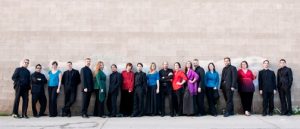Bach Collegium San Diego’s Comforting ‘Requiem’ by Herbert Howells
Bach Collegium San Diego has built its enviable reputation on vibrant, historically informed performances of the great choral repertory from the Baroque period. But Music Director Ruben Valenzuela has resisted any inclination to manacle either himself or the ensemble exclusively to early music.
Wednesday (Nov. 4) Valenzuela conducted twelve Bach Collegium singers in Herbert Howells’ a cappella “Requiem” in a short noontime concert at All Saints’ Episcopal Church in Hillcrest. In his verbal introduction to the work, Valenzuela alluded to Howells’ keen interest in Renaissance music, but the “Requiem,” composed in the mid 1930s, surely owes more to the English cathedral choir traditions of the Edwardian period than to early music.Howells did not base his “Requiem” on the traditional Latin text for the Mass for the Dead, but on his own selection of English language texts from the Burial of the Dead service found in the Anglican Book of Common Prayer and on other liturgical sources that interested him. Like Gabriel Fauré’s “Requiem,” Howells’ work radiates hope and serenity, and he carefully avoided the agonies of Judgement Day that provide so much drama to the Requiems of Mozart and Verdi.
The Bach Collegium chorus offered a warm ensemble blend that softened the composer’s austere, modal harmonic palette, and Valenzuela pressed his singers with sufficient urgency to dramatize the composer’s carefully chosen texts. With assertive, declamatory lines, Howells illuminated Psalm 121, “I will lift up mine eyes unto the hills,” which struck me as the work’s center. At times it was easy to detect touches of Renaissance-like counterpoint, especially in the opening movement “O Salvator Mundi,” but there were as many instances of soaring melodies driven by harmonies that would have made the composer’s teacher Charles Villiers Stanford quite proud.
To open the concert, Valenzuela played Howells’ solo organ piece “Master Tallis’s Testament,” which sounded like a meandering improvisation that grew into a slightly pompous liturgical procession. It certainly set an appropriate mood in the traditionally appointed All Saints sanctuary, whose live acoustics treated the choir most favorably.
Compared to the more grandly scaled sacred works of the last century, say Benjamin Britten’s “War Requiem” or Leos Janacek’s “Glagolitic Mass,” Howells’ “Requiem” reveals modest aspiration. That may the reason Howells resisted publishing it until 1980, three years before his death. We will never know for certain. of course.
But there is an earnest fervor in Howells’ writing that is rewarding in performances as disciplined and spirited as the one Bach Collegium San Diego gave.
[themify_box style=”shadow” ]
The next Bach Collegium San Diego Bach at Noon concert will be performed at First Lutheran Church in downtown San Diego on February 3, 2016. BCSD’s concerts of the complete Messiah by G. F. Handel are scheduled for December 5-7 at locations listed on the organization’s website: www.bachcollegiumsd.org .
[/themify_box]
Bach Collegium San Diego Program

Ken Herman, a classically trained pianist and organist, has covered music for the San Diego Union, the Los Angeles Times’ San Diego Edition, and for sandiego.com. He has won numerous awards, including first place for Live Performance and Opera Reviews in the 2017, the 2018, and the 2019 Excellence in Journalism Awards competition held by the San Diego Press Club. A Chicago native, he came to San Diego to pursue a graduate degree and stayed.Read more…

